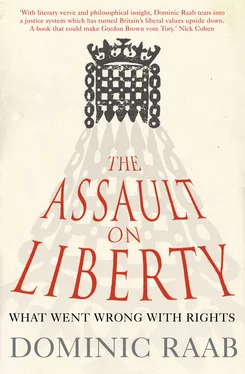Ministers have tried to overcome widespread concern by touting ID cards as a way of solving benefit fraud, illegal immigration and terrorism. Yet, one by one, the government’s claims for ID cards have dissolved under examination. First, it was claimed that ID cards would tackle benefit fraud. However, the overwhelming majority of benefit fraud involves people lying about their personal circumstances – only a fraction of cases involve misrepresentation of identity. Besides, the technology ID cards use is itself highly vulnerable to cloning and, therefore, fraud. So, far from protecting against scams, Microsoft’s National Technology Officer has warned that ID cards could trigger ‘massive identity fraud on a scale beyond anything we have seen before’.
Next, it was said that ID cards would prevent illegal immigration. This was difficult to sustain in light of the exemption from ID cards for all short-term visitors (under three months) to the UK. Even if that loophole was closed, independent tests have shown that the IT used in both biometric passports and ID cards can be cloned within minutes, a vulnerability that those profiting from illegal immigration are bound to exploit.
Finally, it was claimed that ID cards would help prevent terrorism. This assertion proved equally flawed since the vast majority of terrorists do not hide their identity, but rather actively seek notoriety. Spanish ID cards did not stop the Madrid bombers in 2004, Turkish ID cards did not stop the Istanbul bombers in 2003 and German ID cards did not stop the Hamburg terrorist cell that planned 9/11. In Britain, ID cards will do little to stop British-based bombers since it will not be mandatory to carry and produce the card on request. Nor could ID cards protect Britain from foreign terrorists – because short-stay visitors will not be required to hold one. Ministers have now openly conceded that ID cards will do little to prevent terrorism or crime, the Home Office website listing, as popular ‘myth’, that ‘ID cards can stop global terrorism and crime’. As the Home Office’s Security Minister candidly accepted: ‘Perhaps in the past the Government, in its enthusiasm, oversold the advantages of identity cards. We did suggest, or at least implied, that they may well be a panacea for identity fraud, for benefit fraud, terrorism, entitlement and access to public services.’
Unsurprisingly, as the ongoing debate has exposed the flaws in the government’s plans, public enthusiasm for, and confidence in, ID cards has plummeted – with support dropping from 78 per cent in 2003 to 43 per cent in 2007, with 48 per cent of those asked opposed.
In response to widespread criticisms, Home Office ministers decided to phase the roll-out of ID cards. Revised plans announced in 2008 will first target airport workers, then foreign nationals and subsequently students and other sections of the population. Rather than cancel an increasingly discredited policy, the government has shifted its approach, looking to introduce a national system by stealth.
ID cards were presented as a trade-off that would create a small amount of inconvenience but make us all much more secure. The evidence shows that the policy is a fraud – ID cards will impinge on individual liberty and jeopardize our personal security. Given these flaws, and independent estimates that the programme could cost up to £19 billion, the government should scrap its plans for a national ID card register and focus on practical security measures – including improving the integrity of the biometric technology used in visas and passports.
In addition to inroads on habeas corpus, the erosion of the presumption of innocence and reckless intrusions into personal privacy, national security has been used as a pretext for a further government assault on free speech and peaceful protest.
Freedom of speech dates back to the Bill of Rights of 1689. It has been protected by the common law in Britain for centuries, and serves as one of the hallmarks of liberal democracy. In the words of Thomas Jefferson, ‘the liberty of speaking and writing…guards our other liberties’. Nevertheless, freedom of speech has never justified violence. Mill’s classic exposition of liberty explicitly acknowledged that the exercise of individual rights can be limited where it would involve doing harm to others. In short, liberty tolerates those expressing obnoxious or offensive views, but not those who stir up violence or otherwise direct harm against other people. This distinction marks the dividing line in a free society that tolerates free speech but outlaws incitement to violence. In marked contrast, since 1997 the government’s contorted approach has curtailed legitimate free speech on spurious security grounds, but ignored – or been slow to act against – those posing a real threat, such as fanatics who preach extremism and call for violent jihad against Britain.
Widely drawn new security legislation has been over-zealously enforced by police officers against soft targets like peace activists, students and other peaceful protesters in a wholly unnecessary and disproportionate manner. New powers were used to fine the sellers of ‘Bollocks to Blair’ T-shirts (£80 per offence) and arrest, search and eject Walter Wolfgang, a refugee from the Holocaust and member of the Labour Party, who heckled ‘nonsense’ at the Foreign Secretary as he was making the case for the war in Iraq during his speech at the 2005 Labour Party conference.
New security laws have also been used to stifle free speech and protest within one kilometre around the Houses of Parliament. Originally introduced as a precaution against security threats or disorder close to such a sensitive location, new legislation has been relied upon to suppress peaceful protest no matter how small the number of people involved. In May 2006, the Metropolitan Police spent £110,000 raiding and removing Brian Haw’s one-man anti-war protest against British operations in Iraq. The same legislation was used to prosecute and convict two anti-war protesters who read the names of British soldiers killed in Iraq at the Cenotaph on Whitehall. In response to widespread opposition, the government announced a review of the legislation in March 2008, but left it unclear what security restrictions on free speech will remain in place.
ASBOs have also been used to muzzle free speech. Philip Howard, a street evangelist who regularly preached on Oxford Street, was ASBOed in 2006 by Westminster Council after receiving complaints. Mr Howard became famous for his quirky religious catchphrases – such as ‘Don’t be a sinner, be a winner’ – and was generally tolerated by passers-by shopping in central London. His public preaching may have irritated a few people, but was harmless. The use of ASBO legislation by local authorities to silence him is yet another abuse of new law enforcement powers at the expense of free speech.
In 2005, the government again cited security as the basis for its efforts to enact a crime of ‘glorifying’ terrorism. It introduced legislation that aimed to ban public expression of views that indirectly give encouragement to or condone terrorism. The offence was challenged by opposition politicians and civil liberties groups, on grounds of free speech, because it went well beyond even indirect incitement to terrorism. The final law was watered down from the original proposal, so much so that it has never been used in practice. However, critics insist that existing law for prosecuting incitement to violence is perfectly adequate, and that the new definition risks stifling legitimate debate – with legal experts arguing that the new offence is broad enough to prosecute people commemorating the anti-apartheid movement in South Africa or the Easter Rising of 1916 against British rule in Ireland.
In a further round of government proposals aimed at prohibiting offensive language being used against minorities, ministers brushed aside objections on the grounds of free speech to produce proposals to outlaw inciting religious hatred. Accused of excessive political correctness, the government was originally defeated when it sought to ban incitement to religious hatred with a definition so broad that it risked having a chilling effect on legitimate topics of religious debate. A diluted version of the law was eventually adopted in 2006. It avoids criminalizing language which is merely abusive or offensive, and requires an intention to threaten another person on religious grounds – which would already render the language unlawful under existing law. However, the dilution of the new criminal offence has not stopped the police from trying to prosecute those engaging in legitimate public debate about religious and political opinions. In one ludicrous case, police issued a summons to a fifteen-year-old boy, threatening prosecution under the Public Order Act, for attending a peaceful demonstration holding a placard describing the Church of Scientology as a ‘cult’.
Читать дальше












